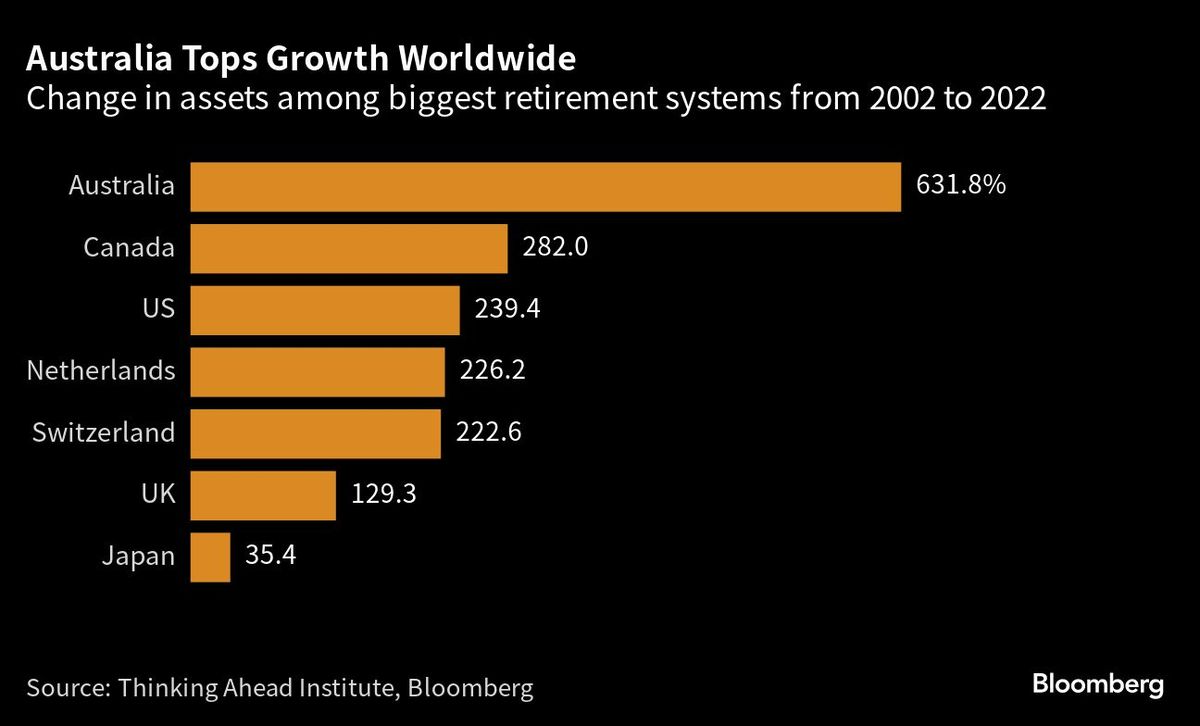
(Jan 7): A 33-year-old piece of legislation in Australia is helping to spark fresh interest from private equity firms including KKR & Co and Bain Capital as they seek to tap into one of the world’s fastest-growing money management industries.
Since its inception in 1992, Australia’s compulsory pension system has amassed a A$4 trillion (US$2.5 trillion or RM11.27 trillion) nest egg that’s poised to triple over the next two-and-a-half decades, according to a Mercer report. Wealth and fund managers have been the beneficiary of the system. With mandated contributions now poised to rise to an all-time high — the equivalent of 12% of each worker’s salary — some of the biggest buyout firms are circling the space.
CC Capital Partners, set up by a former Blackstone Inc dealmaker, became the latest buyout firm to target the sector with a A$2.9 billion offer Monday for Insignia Financial Ltd. That topped a bid from Bain Capital, setting up a potential bidding war with the Boston-based firm.
CC Capital’s move follows KKR’s A$2.2 billion offer last year for part of Australian money manager Perpetual Ltd, while hedge fund Regal Partners Ltd made a pitch for another fund company Platinum Asset Management Ltd.
“The Australian market is unique globally given the structure of mandated employee contributions, which means by definition the industry has a natural tailwind which should mean year-over-year growth,” said Manoj Jain, co-founder and co-chief investment officer of hedge fund Maso Capital.
Mercer forecasts a dozen mega-funds will control more than A$100 billion each by 2028. So-called industry super funds, born out of the union movement, manage the vast bulk of the savings. Private asset management firms with their shareholder-profit model also oversee a significant chunk.
That growth has led to a surge in investment and mergers. Announced deals targeting Australian financial services firms totalled more than US$64 billion over the last five years, more than double the US$29 billion in the previous five years, according to data compiled by Bloomberg.
More deals
CC Capital is the latest firm to enter the fray. The family office set up by Chinh Chu bid A$4.30 per share in cash for Insignia. That exceeded the A$4 a share offer from Bain Capital, which Insignia rejected last month. A representative for Bain declined to comment on the rival offer.
CC Capital is an insurance and asset management firm that Chu, who left Blackstone in 2015, has begun to assemble in the mold of Apollo Global Management Inc. The company has been examining deals in Australia since 2018 and was outbid when National Australia Bank sold its superannuation arm MLC Wealth to Insignia in 2020, according to a person familiar with the matter, who asked not to be identified as they weren’t authorized to speak publicly. CC Capital did not immediately respond to an e-mailed request for comment.
Insignia manages A$319 billion across its sprawling portfolio. That includes billions in retirement savings across a range of funds, making it among Australia’s top 10 largest players. It has a A$90 billion asset management business and two financial advice units.
Still, Insignia’s challenges underline those common in the space. The company had outflows of A$1 billion for the three months to Sept 30, though its funds under management increased 2.7%.
Besides the potential growth in the pension fund business, private equity firms are drawn by the opportunity to cut costs and reduce debt at some of the Australian money managers, Jain said.
“Globally, the sector is consolidating with the need for scale to bring operating efficiencies,” he said. “International operators including private equity often look at them and believe they can reduce the cost base while increasing fund returns.”
Still, getting deals done hasn’t been easy. Perpetual rejected a takeover offer from Australian investment house Washington H Soul Pattinson & Co before it struck the carve out arrangement with KKR.
That deal with the US firm is now in danger of collapsing over an unexpected tax bill. Regal Partners meanwhile ended takeover talks with Platinum after almost two months of due diligence failed to lead to an improved offer.
Michael Vrisakis, a partner at law firm Herbert Smith Freehills, dubbed the sector’s takeover activity a phase of “AMCS.”
“That is ‘acquisition musical chair syndrome’ where acquirers realise that there is a shrinking number of accessible targets and bidding activity becomes affected by the desire to find a seat at the acquisition table,” Vrisakis said.
“There is a perception that smaller players cannot compete and can be effectively mopped up with the right acquisition.”
Uploaded by Chng Shear Lane

